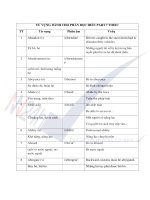TỪ VỰNG TOEIC unit 9
Bạn đang xem bản rút gọn của tài liệu. Xem và tải ngay bản đầy đủ của tài liệu tại đây (253.76 KB, 60 trang )
Unit 9
HER FUG COSM SCI JUNCT PART MIS PEL Words from Mythology
Quiz 9-1 Quiz 9-2 Quiz 9-3 Quiz 9-4 Quiz 9-5 Review Quizzes 9
HER comes from the Latin verb haerere, meaning “to stick.” Another form
of the verb produces the root hes-, seen in such words as adhesive, which
means basically “sticky” or “sticking,” and hesitate, which means more or
less “stuck in one place.”
adherent
(1) Someone who follows a leader, a party, or a
profession. (2) One who believes in a particular philosophy or religion.
• The general's adherents heavily outnumbered his opponents and managed to
shout them down repeatedly.
Just as tape adheres to paper, a person may adhere to a cause, a faith, or a
belief. Thus, you may be an adherent of Hinduism, an adherent of
environmentalism, or an adherent of the Republican Party. A plan for cutting
taxes always attracts adherents easily, regardless of what the cuts may result
in.
cohere
To hold together firmly as parts of the same mass.
• His novels never really cohere; the chapters always seem like separate short
stories.
When you finish writing a paper, you may feel that it coheres well, since it's
sharply focused and all the ideas seem to support each other. When all the
soldiers in an army platoon feel like buddies, the platoon has become a
cohesive unit. In science class you may learn the difference between cohesion
(the tendency of a chemical's molecules to stick together) and adhesion (the
tendency of the molecules of two different substances to stick together).
Water molecules tend to cohere, so water falls from the sky in drops, not as
separate molecules. But water molecules also adhere to molecules of other
substances, so raindrops will often cling to the underside of a clothesline for a
while before gravity pulls them down.
incoherent
(1) Unclear or difficult to understand. (2)
Loosely organized or inconsistent.
• The police had found him in an abandoned warehouse, and they reported
that he was dirty, hungry, and incoherent.
Incoherent is the opposite of coherent, and both commonly refer to words
and thoughts. Just as coherent means well ordered and clear, incoherent
means disordered and hard to follow. Incoherence in speech may result from
emotional stress, especially anxiety or anger. Incoherence in writing may
simply result from poor planning; a twelve-page term paper that isn't written
until the night before it's due will generally suffer from incoherence.
inherent
Part of something by nature or habit.
• A guiding belief behind our Constitution is that individuals have certain
inherent rights that can't be taken away.
Inherent literally refers to something that is “stuck in” something else so
firmly that they can't be separated. A plan may have an inherent flaw that will
cause it to fail; a person may have inherent virtues that everyone admires.
Since the flaw and the virtues can't be removed, the plan may simply have to
be thrown out and the person will remain virtuous forever.
FUG comes from the Latin verb fugere, meaning “to flee or escape.” Thus, a
refugee flees from some threat or danger, while a fugitive is usually fleeing
from the law.
centrifugal
focus.
Moving outward from a center or central
• Their favorite carnival ride was the Round-up, in which centrifugal force
flattened them against the outer wall of a rapidly spinning cage.
Centrifugal force is what keeps a string with a ball on the end taut when you
whirl it around. A centrifuge is a machine that uses centrifugal force. At the
end of a washing machine's cycle, it becomes a weak and simple centrifuge
as it whirls the water out of your clothes. Centrifuges hundreds of thousands
of times as powerful are essential to nuclear technology and drug
manufacturing. Part of an astronaut's training occurs in a centrifuge that
generates force equal to several times the force of gravity (about like a
washing machine) to get them used to the forces they'll encounter in a real
space mission.
refuge
Shelter or protection from danger or distress, or a place that
provides shelter or protection.
• Caught in a storm by surprise, they took refuge in an abandoned barn.
The re- in refuge means basically “back” or “backward” rather than “again”
(see RE-); thus, a refugee is someone who is “fleeing backward.” Refuge
tends to appear with certain other words: you generally “seek refuge,” “take
refuge,” or “find refuge.” Religion may be a refuge from the woes of your
life; a beautiful park may be a refuge from the noise of the city; and your
bedroom may be a refuge from the madness of your family.
fugue
A musical form in which a theme is echoed and imitated by
voices or instruments that enter one after another and interweave as the piece
proceeds.
• For his debut on the church's new organ, the organist chose a fugue by J. S.
Bach.
Bach and Handel composed many fugues for harpsichord and organ in which
the various parts (or voices) seem to flee from and chase each other in an
intricate dance. Each part, after it has stated the theme or melody, apparently
flees from the next part, which takes up the same theme and sets off in
pursuit. Simple rounds such as “Three Blind Mice” or “Row, Row, Row
Your Boat” could be called fugues for children, but a true fugue can be long
and extremely complex.
subterfuge
(1) A trick designed to help conceal, escape, or
evade. (2) A deceptive trick.
• The conservatives' subterfuge of funding a liberal third-party candidate in
order to take votes away from the main liberal candidate almost worked that
year.
With its “flee” root, the Latin verb subterfugere meant “to escape or avoid.”
Thus, a subterfuge is a way of escaping blame, embarrassment,
inconvenience—or even prison—by tricky means. The life of spies consists
of an endless series of subterfuges. In the more everyday world, putting
words like “heart-healthy” on junk-food packaging is a subterfuge to trick
unwary shoppers. And getting a friend to call about an “emergency” in order
to get out of an evening engagement is about the oldest subterfuge in the
book.
Quiz 9-1
A. Fill in each blank with the correct letter:
a. cohere
b. refuge
c. incoherent
d. fugue
e. centrifugal
f. adherent
g. subterfuge
h. inherent
1. The author tries to take on so many different subjects that the book really
doesn't ___ very well.
2. All the plans for the surprise party were in place except the ___ for
keeping her out of the house until 6:30.
3. She had left Scientology and was now an ___ of the Unification Church.
4. Fleeing the Nazis, he had found ___ in the barn of a wealthy family in
northern Italy.
5. By the time his fever reached 105°, the boy was mumbling ___ sentences.
6. A rock tied to a string and whirled about exerts ___ force on the string.
7. Mahatma Gandhi believed goodness was ___ in humans.
8. As the last piece in the recital, she had chosen a particularly difficult ___
by Bach.
Answers
B. Choose the closest definition:
1. inherent
a. built-in b. inherited c. confused d. loyal
2. fugue
a. mathematical formula b. musical form c. marginal figure d.
masonry foundation
3. adherent
a. sticker b. stinker c. follower d. flower
4. centrifugal
a. moving upward b. moving backward c. moving downward d.
moving outward
5. cohere
a. control b. react c. pause d. unite
6. subterfuge
a. overhead serve b. underhanded plot c. powerful force d. secret
supporter
7. incoherent
a. attached b. constant c. controlled d. confused
8. refuge
a. starting point b. hideout c. goal d. return
Answers
COSM comes from the Greek word for “order.” Since the Greeks believed
the universe was an orderly place, words in this group usually relate to the
universe. So cosmonaut was the word for a space traveler from the former
Soviet Union. (The roots of our own word, astronaut, suggest “star traveler”
instead.) Oddly enough, cosmetics comes from the same root, since putting
things in order is similar to decorating something—such as your face.
cosmos
(1) The universe, especially when it is viewed as
orderly and systematic. (2) Any orderly system that is complete in itself.
• The astronomer, the biologist, and the philosopher all try in their own ways
to make sense of the cosmos.
Cosmos often simply means “universe.” But the word is generally used to
suggest an orderly or harmonious universe, as it was originally used by
Pythagoras in the 6th century B.C. Thus, a religious mystic may help put us
in touch with the cosmos, and so may a physicist. The same is often true of
the adjective cosmic: Cosmic rays (really particles rather than rays) bombard
us from outer space, but cosmic questions come from human attempts to find
order in the universe.
cosmology
(1) A theory that describes the nature of the
universe. (2) A branch of astronomy that deals with the origin and structure
of the universe.
• New Age teachers propose a cosmology quite unlike the traditional Jewish,
Christian, or Islamic ways of viewing the universe.
Most religions and cultures include some kind of cosmology to explain the
nature of the universe. In modern astronomy, the leading cosmology is still
the Big Bang theory, which claims that the universe began with a huge
explosion that sent matter and energy spreading out in all directions. One
reason why fans watch Star Trek is for the various cosmologies depicted in
the show, including different conceptions of space, time, and the meaning of
life.
microcosm
Something (such as a place or an event) that
is seen as a small version of something much larger.
• The large hippie communes of the 1960s and '70s were microcosms of
socialist systems, with most of socialism's advantages and disadvantages.
A troubled urban school can look like a microcosm of America's educational
system. A company's problems may be so typical that they can represent an
entire small country's economic woes “in microcosm.” Microcosm, and
especially its synonym microcosmos, are also sometimes used when talking
about the microscopic world. The documentary film Microcosmos is devoted
to the remarkable insect life in an ordinary meadow on a single summer's
day.
cosmopolitan
(1) Having international sophistication
and experience. (2) Made up of persons, elements, or influences from many
different parts of the world.
• New York, like most cosmopolitan cities, offers a wonderful array of
restaurants featuring foods from around the world.
Since cosmopolitan includes the root polit-, from the Greek word for
“citizen”, someone who is cosmopolitan is a “citizen of the world.” She may
be able to read the morning paper in Rio de Janeiro, attend a lecture in
Madrid, and assist at a refugee camp in Uganda with equal ease—and maybe
all in the same week. And a city or a country that is cosmopolitan has aspects
and elements that come from various countries.
SCI comes from the Latin verb scire, “to know” or “to understand.” The root
appears in such common words as science, which originally meant simply
“knowledge,” and conscience, meaning “moral knowledge.” And to be
conscious is to be in a state where you are able to know or understand.
conscientious
(1) Governed by morality; scrupulous.
(2) Resulting from painstaking or exact attention.
• New employees should be especially conscientious about turning in all their
assignments on time.
Conscience and its adjective conscientious both come from a Latin verb
meaning “to be aware of guilt.” Conscientious indicates extreme care, either
in observing moral laws or in performing assigned duties. A conscientious
person is someone with a strong moral sense, who has feelings of guilt when
he or she violates it. A conscientious worker has a sense of duty that forces
him or her to do a careful job. A conscientious report shows painstaking work
on the part of the writer. And a conscientious objector is someone who, for
reasons of conscience, refuses to fight in an army.
nescience
Lack of knowledge or awareness: ignorance.
• About once every class period, my political-science professor would angrily
denounce the nescience of the American public.
This word, which means literally “non-knowledge,” is only used by
intellectuals, and the same is true of its adjective, nescient. We all have heard
the remarkable facts: 40% of us believe that humans and dinosaurs lived on
earth at the same time; 49% believe that the President can ignore the
Constitution; 60% can't name the three branches of government; 75% can't
find Israel on a map; and so on. Is it any wonder we Americans are
sometimes called nescient?
prescient
going to happen.
Having or showing advance knowledge of what is
• For years she had read the Wall Street Journal every morning, looking for
prescient warnings about crashes, crises, and catastrophes on the horizon.
Being truly prescient would require supernatural powers. But well-informed
people may have such good judgment as to appear prescient, and prescient is
often used to mean “having good foresight.” Some newspaper columnists
may seem prescient in their predictions, but we can't help suspecting that any
apparent prescience is usually the result of leaks from people with inside
knowledge.
unconscionable
(1) Not guided by any moral sense;
unscrupulous. (2) Shockingly excessive, unreasonable, or unfair.
• When the facts about how the cigarette industry had lied about its practices
for decades finally came out, most Americans found the behavior
unconscionable.
Something that can't be done in good conscience is unconscionable, and such
acts can range from betraying a confidence to mass murder. For a fivesyllable word, unconscionable is actually quite common. This is partly
because it isn't always used very seriously; so, for example, a critic is free to
call a fat new book “an unconscionable waste of trees.” In law, an
unconscionable contract is one that, even though it was signed by both
parties, is so ridiculous that a judge will just throw it out.
Quiz 9-2
A. Complete the analogy:
1. clever : brainy :: prescient : ___
a. evil b. wise c. existing d. painstaking
2. village : city :: microcosm : ___
a. flea circus b. universe c. scale model d. bacteria
3. bold : shy :: cosmopolitan : ___
a. planetary b. naive c. unique d. nearby
4. informed : ignorant :: conscientious : ___
a. careful b. all-seeing c. well-informed d. scientific
5. geology : earth :: cosmology : ___
a. sophistication b. universe c. explanation d. appearance
6. data : information :: nescience : ___
a. wisdom b. ignorance c. judgment d. learning
7. forest : trees :: cosmos : ___
a. stars b. earth c. orbits d. universe
8. corrupt : honest :: unconscionable : ___
a. orderly b. attractive c. universal d. moral
Answers
B. Match the definition on the right to the correct word on the left:
1. cosmopolitan a. having foresight
2. nescience
b. universe
3. microcosm
c. lack of knowledge
4. conscientious d. well-traveled
5. unconscionable e. small world
6. cosmology
f. scrupulous
7. prescient
g. inexcusable
8. cosmos
h. description of the universe
Answers
JUNCT comes from the Latin verb jungere, meaning “to join.” A junction is
a place where roads or railways come together. A conjunction is a word that
joins two other words or groups of words: “this and that,” “to be or not to
be.”









